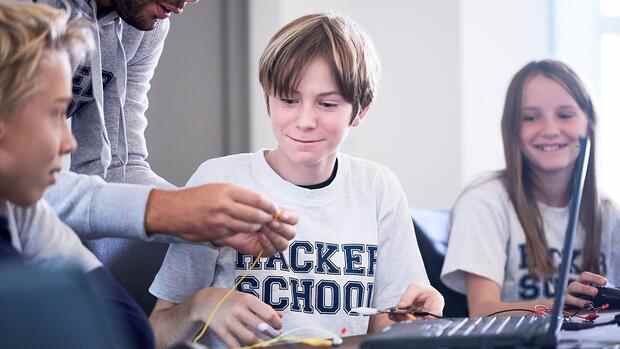keel Unscrewing the glass, inserting a knife, distributing jam: Spreading bread is part of the curriculum at the Kämmer International Bilingual School (KIBS) in Hanover – in computer science. At the private school, even first graders are introduced to programming without spending hours in front of the computer. They should learn in a playful way how a binary machine ticks. “Coding requires thinking through complex processes, breaking them down into individual steps and formulating precise, unambiguous instructions,” explains primary school principal Maren Clarke.
This can also be practiced offline. For example, students can navigate each other to a hidden treasure, remotely control another child with a self-made cardboard “controller” like a robot – or “program” their teacher so that she makes a delicious sandwich with jam.
IT experts and programmers are urgently needed in business, and yet the teaching of digital skills is neglected in many curricula. Coding is one of the key skills of the 21st century, says Clarke. “As a general education school, we cannot ignore that.”
Encourage creativity and logic
The educator does not share the concern of some parents that coding lessons will turn children into little nerds who are only interested in bits and bytes. Rather, it promotes creativity, logical and problem-solving thinking and media skills. Like almost all the teachers at the bilingual school, Clarke, who is responsible for the curriculum from school enrollment to high school, has taught abroad for a long time. But much of what has proven itself internationally is not found in German curricula. It therefore supplements the compulsory computer science program in Lower Saxony with international standards.
Top jobs of the day
Find the best jobs now and
be notified by email.
A majority of all parents would like more digital content and media in the classroom. According to a survey by the industry association Bitkom, 60 percent of parents believe that schools should teach programming as naturally as writing and arithmetic. But the reality is different: 30 years after the invention of the Internet, the range of computer science courses in Germany is still a “patchwork quilt”, writes the Gesellschaft für Informatik (GI) in the “Informatik-Monitor”. Whether and when students are taught digital skills depends largely on where they live and the type of school.
But without exciting projects and age-appropriate lessons, many children, especially girls, would write off computer science as a boring and complicated subject at an early age, warns GI school expert Peer Stechert. “Computer science education must not be a privilege. In a digitally networked world, it must become an integral part of general education.”
More and more private providers are trying to do just that. Numerous private schools are among the “smart schools” with modern digital infrastructure, pedagogical concepts and dedicated IT-savvy staff, which Bitkom honors every year. In addition to the KIBS in Hanover, the Best Sabel elementary school in Berlin and the Galileo elementary school in Stuttgart are also represented, both of which belong to the Klett Group, as well as a number of church-sponsored schools. There are also smart boarding schools, such as Steinhöfel in Marburg or Hagerhof Castle in Bad Honnef.
There is also a growing range of coding courses outside of school. The spectrum of initiators ranges from private educational companies such as Berlitz to regional parent initiatives. The Hamburg Hacker School, in cooperation with several companies, offers nationwide programming workshops for schoolchildren aged eleven to 18. Instead of educators, IT professionals show what they are working on and pass on their knowledge in clear projects – fun factor included.
The content is determined by the honorary course leaders themselves, they should convey what they are passionate about. “We deliberately do not follow a fixed curriculum,” says headmistress Julia Freudenberg. “When an adult is fascinated by something, it’s easy to get children excited about it too.”
Thousands of teachers are missing
It would be necessary. Even today, employers cannot find enough qualified employees in the IT sector. And according to a recent study by the Boston Consulting Group (BCG), the shortage of skilled workers will continue to worsen by 2030. By then, the management consultancy assumes that there will be more than a million vacancies – 56 percent more than today.
Headteacher Clarke advocates the introduction of computer science as a compulsory subject from primary school to high school, as she knows it from Great Britain. But that would require much more than political will: According to the Higher Education Report, 30,000 computer science teachers would be needed, five times more than are currently employed throughout Germany.
In addition to the technical equipment, many schools apparently simply lack the know-how to use smartboards, tablets or programming apps in the classroom. Not even 25 percent of the schools have a professional IT administrator, less than half have a stable WLAN, according to a survey of high school teachers by the German Philology Association.
Companies and business-related institutions are trying to counteract this type of skills shortage with offers specifically for teachers. For example, the retail group Otto Group has developed the training program “[email protected]’ that Hamburg teachers can use free of charge.
With “Coding for Tomorrow”, the Vodafone Foundation offers educators in five federal states programming courses, teaching material and training. “Without digital reference in the classroom, children will have a hard time on the job market of the future,” says project manager Claudia Tillmann.
The non-profit organization Code.org, which is financially supported worldwide by companies such as Amazon, Facebook, Google and Microsoft, is pursuing a similar concept. Maren Clarke uses Apple’s free continuing education courses at KIBS: “As a bilingual school, we need material in German and English,” she says. Even to spread bread.
More: The three retraining courses with the best career opportunities
